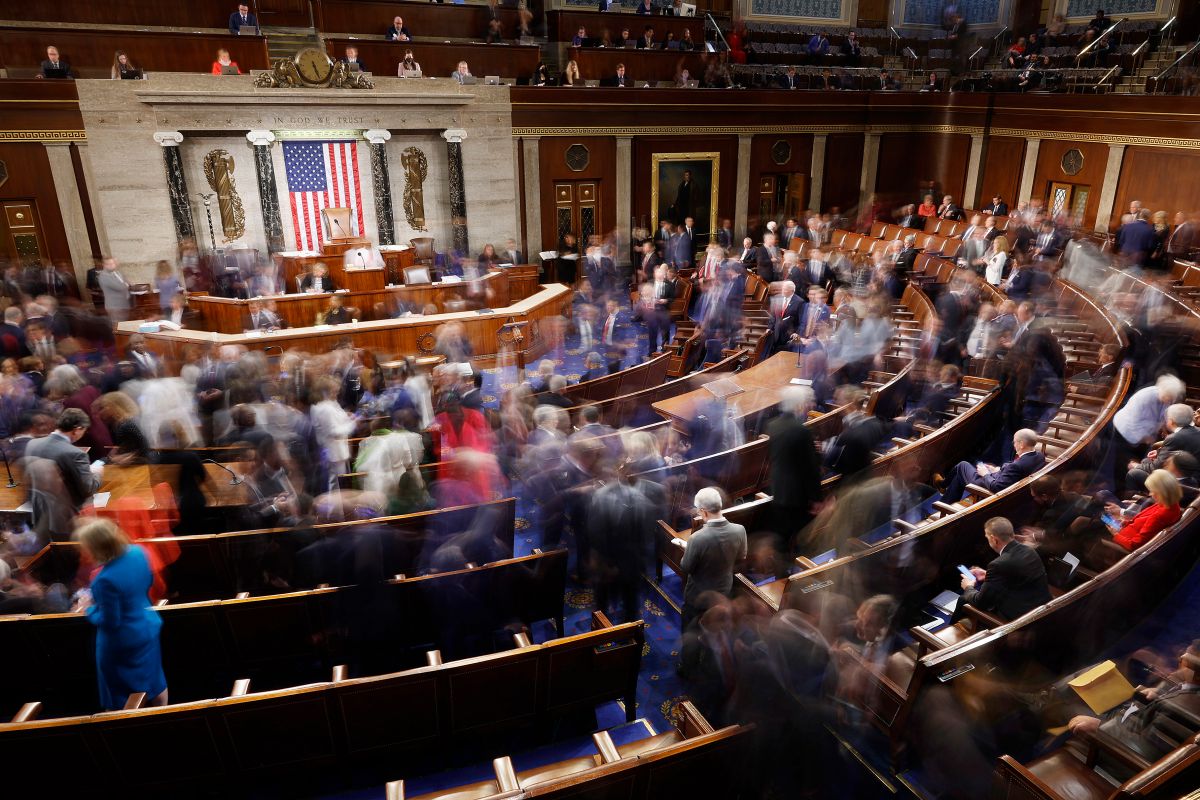Internal divisions within the Republican Party on Tuesday prevented the election of Nancy Pelosi’s successor as Speaker of the United States House of Representatives despite having a sufficient congressional majority to do so.
For the first time in a century, the House was unable to name its new leader in a single vote. The leader of the Republican caucus, Californian Kevin McCarthy, tried to take office three times, but each time he failed due to a rebellion by the hard-wing of his own party.
After hours of debate, the congressmen agreed to postpone until Wednesday the vote to choose the one who will lead the chamber in the 118th legislature, which cannot advance until the vacant position is assumed.
split republican party
The origin of this blockade situation can be found in the midterm elections on November 8, in which Congress was renewed.
Although the Republicans wrested the majority of the House of Representatives from the Democrats and may complicate things for President Joe Biden in his last two years in office, the conservative victory was narrow and far from the “red wave” that many media had predicted.
Furthermore, the Democrats not only managed to retain a majority in the Senate, but also extended their control with a new seat.
The more moderate Republicans blame this insufficient electoral performance on the leading role that former President Donald Trump retains in the party, who supported several extremist candidates who ended up losing the elections.
Meanwhile, the hard wing blames the campaign designed by McCarthy, who has led the party in the House since 2014.
Failed attempts
After almost a decade wanting the position, McCarthy saw this Tuesday how the possibility of becoming the third authority in the country, after the president, Joe Biden, and the vice president, Kamala Harris, who chairs the Senate.
In none of the three votes did he get the 218 votes he needed. She was left with 203 in the first two and 202 in the last.
And it is that in a clear signal against its leader, a small group of the most right wing of the party, grouped in the Freedom Caucus, nominated alternative candidates.
First up was Andy Biggs of Arizona who got 10 votes. Then Jim Jordan, from Ohio, who had 19 supports in the second ballot and 20 in the third, despite the fact that he himself had called to vote for McCarthy.
The Democratic Party, however, closed ranks with its candidate, Congressman Hakeem Jeffries, from New York, who the three times concentrated the 212 supporters of his political formation, also insufficient to preside over the chamber.
Rep. Elise Shefank tried unsuccessfully to win over fractious Republicans by portraying McCarthy as “deeply conservative” and “proud” to be anti-abortion and pro-gun rights.
In a clear mockery of the Republicans, Democratic Congressman Pete Aguilar exclaimed in his speech: “The Democrats of the House are united.”
without a quick solution
The rupture was already seen coming even before the opening of the legislature. After a meeting with his colleagues, McCarthy appeared before the media to announce that he did not have enough votes and that there would be a “battle in the chamber.”
The Californian attacked the comrades who think more about “positions for themselves than in the country”, but warned that he would not go “anywhere” and that he would fight until the end.
The ultra-conservative congressmen reproach McCarthy for not having negotiated with them a reform of the debate rules or the names to lead the congressional committees in the new legislature.
Some of them declared before the press to confirm that they were not going to support McCarthy and to reproach that the candidate to preside over the House sought their “submission” without conditions, in the words of the representative for Florida Matt Gaetz.
Both sides undertook a battle of attrition in which neither gave in, so they agreed to resume the session this Wednesday at noon.
The regulation does not contemplate any other alternative to continuing to repeat votes until someone achieves the necessary majority to replace the gap left until now by the omnipresent Nancy Pelosi, in office for two terms (2007-2011 and 2019-2023).
The precedents are not very encouraging. In 1923, the president of the Chamber was elected in a ninth ballot, while in 1869 it was achieved after 60 ballots, a process that lasted for two months.
With information from EFE
Also read:
- Republican representative says he fears for the future of the United States if Donald Trump is not impeached by January 6
- Cassidy Hutchinson told the committee on January 6 that Mark Meadows burned documents during the transition period between the Trump administration and Biden.
- Donald Trump ‘knowingly’ committed dozens of tax crimes, according to his biographer
